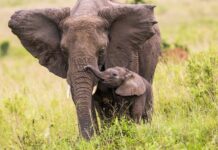The Cecil Summit, hosted this week by Oxford University’s Wildlife Conservation Research Unit (WildCRU) and Panthera, the global wild cat conservation organization, has outlined an emboldened commitment and path forward to address the conservation crisis facing Africa’s lions.

Honoring the global outpouring of outrage and recognition that accompanied the death of the now legendary lion known as Cecil, the Summit assembled some of the world’s leading lion biologists alongside influential experts from the fields of international policy, law enforcement, economics, ethics, law and other sectors.
Together, this brain trust of conservation specialists explored the complex and varied issues affecting the international mosaic of lion conservation, and the innovative solutions required to secure a future for both lions and their landscapes, as well as the people of Africa.
WildCRU Director David Macdonald stated, “Lion conservation has the world’s attention as never before. The Cecil Summit is a continuation of an evolving discussion with members of Africa’s nation states who must be part of the solution to save our global heritage.”
Cecil Summit participants produced a five-point declaration, with the goal of forming the foundation of a renewed path forward for lion conservation.
Restoring Lionscapes: Reinstating the economic and social value of lions across their African landscapes in perpetuity.
Inspiring National Communities: Increasing the pride of local people for their lions and establishing fairness in conservation practices.
Inspiring a Global Community: Increasing international interest in lion conservation and mobilizing financial resources on its behalf.
Enacting the Robin Hood Model: Harnessing members of the global community with the greatest interest and financial resources to support conservation in lion range states.
Financing Lion Conservation: Accelerating the governmental and multi-national engines of financial support required to assist African nations to save the lion.
On behalf of WildCRU and Panthera, WildCRU Director David Macdonald addressed members of the Cecil Summit, media and general public at the closing Summit panel Wednesday to share this declaration. View the recorded session here.
Former editor of The Guardian, Alan Rusbridger, moderated a discussion amongst panel participants on the complexities of the international conservation frontier. Contributors included Director General of the United Nations Environment Programme Achim Steiner, leading lion biologist Craig Packer, UK Minister of State at the Department for International Development Rory Stewart and Panthera founder and historic WildCRU benefactor, Dr. Thomas S. Kaplan. The panel was launched with a message from Edmond Moukala, UNESCO World Heritage Centre’s Africa Unit Chief.
Panthera President and Chief Conservation Officer, Dr. Luke Hunter, shared, “The Cecil Summit underscores the fact that compelling solutions and enormous opportunities to save the lion are within our grasp. Over 1 million square kilometers of lion range are already legally protected but those areas need massive support to truly thrive. Equally, the people that live with lions need to enjoy more benefits from protected areas and have access to new incentives that foster conservation on their own lands.”
Hunter continued, “Conservation and human prosperity are inter-twined in Africa. If we can secure these parks and reserves, we ensure not only the lion’s future but also the future of local people whose livelihoods are directly linked to tourism and other economic opportunities that result.”
Now famous the world over, Cecil the lion was studied through the Hwange Lion Project in Zimbabwe for eight years before his tragic death in 2015 outside of Hwange National Park. Today, the project lives on under the operation of Oxford University’s Wildlife Conservation Research Unit (WildCRU), with support from Panthera.
Emboldened by the urgency of the African lion conservation crisis, WildCRU and Panthera resolved to utilize the momentum from the death of Cecil to arouse a Cecil Movement. As the world has learned, the lion is in need of conservation attention now more than ever, with an estimated 20,000 individuals remaining across the entire African continent, a number which represents a decline of 90% over the last century.
Panthera Founder and WildCRU benefactor, Dr. Thomas Kaplan, shared, “The Summit holds the potential to mark an extraordinary turning point for lion conservation. As the participants showed, the land and people are there to save lions. What is needed is will…and commitment. By combining the insights of the broadest array of thinkers and stakeholders in the field, from practitioners on the ground in Africa to government figures, there’s hope that the voice that was given to Cecil and his species may yet turn into a roar.”
Preceding the Cecil Summit, Panthera, WildAid and WildCRU released a new lion report outlining the ongoing threats contributing to the conservation crisis facing lions. Read the report, entitled Beyond Cecil: Africa’s Lions in Crisis, and learn about the #LetLionsLive campaign at letlionslive.org.
Panthera’s Project Leonardo leads or supports initiatives in 15 African nations to bring lion populations back to a minimum of 30,000 individuals within 15 years. Learn more.

















